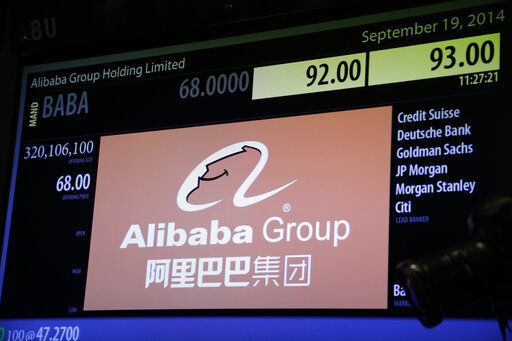HONG KONG — Chinese e-commerce firm Alibaba said Monday that it wants to keep its shares listed in both New York and Hong Kong, days after U.S. regulators included it in a list of companies that might be delisted for not complying with auditing requirements.
The U.S. Securities and Exchange Commission has said foreign companies face having their shares delisted if they don’t give American regulators access to their financial statements and auditing process as required of other companies around the world.
The addition of Alibaba to the list is the latest blow as it suffers the fallout from Beijing’s regulatory crackdown on the technology industry.
Alibaba’s inclusion among the companies potentially facing delisting follows its announcement last week that it wants to pursue a primary listing in Hong Kong, where it now has a secondary listing. That move would enable Alibaba to tap a wider base of investors, including those in mainland China.
“Alibaba will continue to monitor market developments, comply with applicable laws and regulations and strive to maintain its listing status on both the NYSE and the Hong Kong Stock Exchange,” the company said in an announcement filed to the Hong Kong stock exchange Monday.
The company said that the fiscal year that ended March 31, 2022 was its first “non-inspection” year under regulations that say a company that goes three years without complying with audit requirements will be forced to delist.
Alibaba’s Hong Kong stock price plunged 3.76% in Hong Kong on Monday, closing at 89.60 Hong Kong dollars.
The move by the SEC to include Alibaba for possible delisting could be in retaliation for its plans to seek the primary listing in Hong Kong, said Francis Lun, an investment manager and a veteran market commentator.
Alibaba is one of the most heavily-traded Chinese companies in the U.S.
“If you look at the stock price, investors are very pessimistic (about Alibaba),” Lun said. Alibaba’s New York-listed stock is down over 55% over the last 12 months.
Alibaba was fined a record $2.8 billion for anti-monopoly violations, and regulators scrutinized its financial affiliate Ant Financial closely after Ant was ordered to halt its initial public listing days before it was due to go public. The company has also seen slowing growth amid COVID-19 uncertainties and a general slowdown in the Chinese economy.
The primary listing in Hong Kong is expected to be completed by the end of this year.
Alibaba first went public in New York in September 2014 in what was then the world’s biggest initial public offering at $25 billion. It completed a secondary listing in Hong Kong in November 2019.
Other Chinese firms seeking a primary listing in Hong Kong include cloud computing service provider Kingsoft Cloud Holdings and video sharing site Bilibili Inc.


